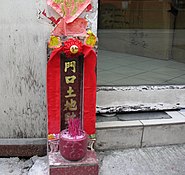
A shrine to a local Tudigong
A Tudigong (Simplified Chinese: 土地公, literally: "Lord of the Land") is a kind of Chinese tutelary deity of a specific location.[1] There are several Tudigongs corresponding to different geographical locations, sometimes multiple ones will be venerated together in certain regions.[2]
They are tutelary (i.e. guardian or patron) deities of locations and the human communities who inhabit it in Chinese folk religion and Taoism.[3] They are portrayed as old men with a long beards.[4]
The definitive characteristic of Tudigongs is that they are limited to their specific geographical locations, the Tudigong of one location is not the Tudigong of another location[1]
Tudigongs are considered to be below City Gods[3] and above Landlord Gods.
Often a specific person who did a great service to their local community will be seen as becoming a Tudigong after their death.[5]
Names[]
Tudigongs go by a variety of names including Tudigong (Simplified Chinese: 土地公, literally; "Lord of the Land") or Tudishen (Simplified Chinese: 土地神, literally: "God of the Land"), also known simply as Tudi (Traditional Chinese: 土地, literally: "land, soil") and translated as Lord of the Earth,[4]
Other names of the god include:[6]
- Tugong (土公 "Lord of the Soil");
- Tudiye (土地爺 "Soil-Ground Father");
- Dabogong (大伯公 "Great Elder Lord") or Bogong (伯公 "Elder Lord");
- Sheshen (社神}} "God of the Soil") or Shegong (社公 "Lord of the Soil");
- This word may be confusing as 社 is often used to refer to society or shrines, but the original etymology was linked to soil.
- Tudijun (土帝君 "Ruler God of the Soil").
Extended titles of the god include:
- Tudihuofushen (土地或福神 "God who May Bless the Soil");
- Fudezhengshen (福德正神 "Right God of Blessing and Virtue") or Fudegong (福德公 "Lord of Blessing and Virtue").
Commoners often call their local Tudigong "grandfather" (yeye), which reflects the close relationship with the common people.[3]
Etymology[]

Etymology of Sheshen. Both characters are religious in nature
Tudigongs are believed to have originally developed out of the Sheshen belief system[5]
Sheshen (社神) also known as village gods are Chinese deities associated with the soil.[7]
The character 社 is now primarily associated with Society.[8] Being present in such compounds as socialism (社会主义, Shèhuì zhǔyì)[9] and sociology (社会学, Shèhuì xué)[10] and social media (社群媒體, Shè qún méitǐ).[11]
However originally the character 社 meant soil, and had a connotation of divinity, see the diagram on the right for more info on its relationship with the Oracle bone script
The character 社 alone historically referred to such deities[8] it is a combination of deity (示) and soil (土) meaning "god of the land"[12]
Sheshen are associated with soil and grain (shèjì, 社稷), with both sometimes being personified as husband and wife[13][14]
Tudigong means Tu (earth), Di, Gong (grandfather/duke)
Sacrifices to Sheshen transitioned to sacrifices to Tudigong[13]
History[]
The earliest known sheshen was Gou Long , a son of Gonggong who was appointed as a god of the soil by Zhuanxu.[7]
Village Gods developed from land worship. Before Chenghuangshen ("City Gods") became more prominent in China, land worship had a hierarchy of deities conforming strictly to social structure, in which the emperor, kings, dukes, officials and common people were allowed to worship only the land gods within their command; the highest land deity was the Houtu ("Queen of the Earth").[3]
Ranked beneath City Gods, the Village Gods have been very popular among villagers as the grassroot deities since the 14th century during the Ming dynasty. Some scholars speculate that this change came because of an imperial edict, because it is reported that the Hongwu Emperor of the Ming dynasty was born in a Village God shrine. The image of the Village God is that of a simply clothed, smiling, white-bearded man. His wife, the Grandmother of the Village, Tǔdìpó , looks like a normal old lady[3]
In later generations they became associated with Wish trees.
Variants[]
Tudipo[]
In the countryside, they are sometimes given wives, Tǔdìpó (土地婆 "Grandmother of the Soil and the Ground"), placed next to them on the altar. They may be seen as just and benevolent deities on the same rank as their husbands, or as grudging old women holding back their husband's benedictions, which explains why one does not always receive fair retribution for good behavior.[3]
Another story says that Tudipo is supposed to be a young lady. After Tudigong received a heavenly rank, he gave everything that the people asked for. When one of the Deities went down to Earth to do inspections, he saw that Tudigong was distributing blessings unnecessarily. Soon after that, the Deity went to the Celestial Palace and reported to the Jade Emperor.[3]
After the Jade Emperor knew this, he found out that there was a lady that was going to be killed, but she was not guilty. Thus, the Jade Emperor told a Deity to go down to Earth and bring the lady to heaven. When the lady was brought to the Celestial Palace, the Jade Emperor bestowed her to Tudigong as his wife. She was ordered to look after how many blessings Tudigong distributes and that they not be unnecessarily distributed. This is why many people do not want to pay respect to Tudipo, because they are afraid that she will not let Tudigong give much wealth to them.[3]
Ông Địa and Thần Tài[]
Vietnam and Cambodia also observe the tradition of enshrining the Earth God at home and in businesses, with the addition of the images of Ông Địa (the earth god who bears a similar appearance to Budai (Hotei), or Maitreya of Buddhism as adaptation), and Thần Tài (the wealth god who is in fact Caishen). In Vietnam, Ông Địa takes the role of the earth god in a similar fashion to both Tudigong and Dizhushen, with Thần Tài serving as his partner or assistant.
Festivals[]
In Taiwan, festivals dedicated to Tudigong typically take place on the second day of the second month and the 15th day of the eighth month on the Chinese lunar calendar.[15] The second day of the second month is said to be Tudigong's birthday.[4] Today these deities are associated with Ritual opera.[16]
Gallery[]
See also[]
References[]
- ↑ 1.0 1.1 "Tudi Gong | Chinese deity | Britannica" (in en). https://www.britannica.com/topic/Tudi-Gong.
- ↑ 基隆市政府 (2020-08-26). "Nuannuan Twins Tudigong Temple". https://tour.klcg.gov.tw/en/attractions/temples/14284627/.
- ↑ 3.0 3.1 3.2 3.3 3.4 3.5 3.6 3.7 The Encyclopedia of Malaysia, vol. Religions & Beliefs, edited by Prof. Dr M. Kamal Hassan & Dr. Ghazali bin Basri. ISBN 9813018518
- ↑ 4.0 4.1 4.2 Stepanchuk, Carol (1991). Mooncakes and Hungry Ghosts: Festivals of China. San Francisco: China Books & Periodicals. p. 125. ISBN 0-8351-2481-9.
- ↑ 5.0 5.1 "首頁 > 宗教知識+ > 宗教神祇 > 土地公(Tudi gong)". http://webcache.googleusercontent.com/search?q=cache:tDXPbNHF63QJ:https://religion.moi.gov.tw/knowledge/content%3Fci%3D2%26cid%3D278&hl=en&gl=ca&strip=1&vwsrc=0.
- ↑ Keith G. Stevens, Chinese Mythological Gods, Oxford University Press, USA, (November 8, 2001), pages 60, 68, 70, ISBN 0195919904 or ISBN 9780195919905
- ↑ 7.0 7.1 Theobald, Ulrich. "Sheshen 社神, Local Deities (www.chinaknowledge.de)" (in en). http://www.chinaknowledge.de/Literature/Religion/personssheshen.html.
- ↑ 8.0 8.1 "社 Chinese English dictionary 社 translate 社 pinyin". 2022-10-14. https://www.mdbg.net/chinese/dictionary?page=worddict&wdrst=0&wdqb=%E7%A4%BE.
- ↑ "socialism translate to Traditional Chinese: Cambridge Dictionary". 2016-02-29. https://dictionary.cambridge.org/dictionary/english-chinese-traditional/socialism.
- ↑ "sociology translate to Traditional Chinese: Cambridge Dictionary". 2015-07-20. https://dictionary.cambridge.org/dictionary/english-chinese-traditional/sociology.
- ↑ "social media | translate to Traditional Chinese: Cambridge Dictionary". 2022-05-04. https://dictionary.cambridge.org/dictionary/english-chinese-traditional/social-media.
- ↑ http://web.archive.org/web/20130915025851/http://www.chinese-characters.org/meaning/7/793E.html
- ↑ 13.0 13.1 "Sheji | Chinese deity | Britannica" (in en). https://www.britannica.com/topic/Sheji.
- ↑ Yang, C. K. Religion in Chinese Society : A Study of Contemporary Social Functions of Religion and Some of Their Historical Factors (1967 [1961]). Berkeley and Los Angeles: University of California Press. page 97
- ↑ Cheng, Shuiping (2011). "Earth God". Encyclopedia of Taiwan. Council for Cultural Affairs. http://taiwanpedia.culture.tw/en/content?ID=4437&Keyword=%E5%9C%9F%E5%9C%B0%E5%85%AC. Retrieved 24 February 2012.
- ↑ 参见《〈辞海〉1999年索引本(音序)》第1480页。
| This page uses content from the English Wikipedia. The original article was at Tudigong. The list of authors can be seen in the page history. |







